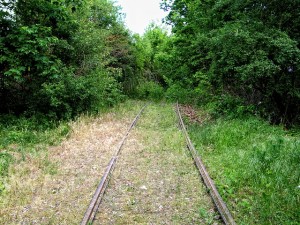end, distance
[noun]
[het eind, de ein-des/ein-den] ![]()
 There are three words for ‘end’ in Dutch: ‘eind’, ‘einde’ and ‘end’. Both ‘eind’ and ‘end’ can also be used in the meaning of ‘(a) distance’, see the Examples below.
There are three words for ‘end’ in Dutch: ‘eind’, ‘einde’ and ‘end’. Both ‘eind’ and ‘end’ can also be used in the meaning of ‘(a) distance’, see the Examples below.
Note that ‘end’ is mostly used informally. When not sure, it’s better to use ‘eind’ instead.
Examples:
– “Ik vond het een goede film maar het eind viel erg tegen, vond je ook niet?”
(“I thought it was a good movie, however the end was very disappointing, didn’t you think so too?”)
– “Pardon, weet u de weg naar de Lomanstraat?” – “Jazeker, u gaat hier rechts de straat in en dan aan het eind links afslaan. Daarna is het de tweede rechts.” – “Ok, dankuwel!”
(“Excuse me, do you know the way to the Lomanstraat?” – “Absolutely, (you) enter the street here to the right and then turn left at the end. Then it is the second (street) on the right.” – “Okay, thank you!”)
– “Kunnen we niet beter de fiets nemen? Het is vanaf hier echt nog een heel eind lopen naar de Noordermarkt. En daarna moeten we ook weer terug!”
(“Had we not better take the bicycle? From here it is still a very long walk to the Noordermarkt. And after that we also have to go back again!”)
– “Een eind lopen? Het is een klein eindje lopen! Wacht ik kijk op GoogleMaps. Nou ja, moet je zien, het is zelfs een kippeneindje! Kom we gaan, we treuzelen langer dan het lopen zelf zal duren!”
(“A long walk? It is but a short walk! Wait, let me check GoogleMaps. Here, look at this, it is even a marginal distance! Come on let’s go, we linger longer than the duration of the walk itself!”)
Expressions:
– “Het bij het rechte eind hebben”: to be right (after doubt or dispute). E.g. ‘Sander heeft het niet altijd bij het rechte eind.’
– “Een eind breien aan iets”: to end an activity [colloquial]. The verb ‘breien’ translates as ‘to knit’.
Example:
– “Jongens, we breien er zo een eind aan; willen jullie alvast beginnen met opruimen?”
(“Guys, we are about to stop; would you please start putting things away?”)
– “Eind goed, al goed”: all’s well that ends well.
Related words:
– Einde: end [noun] [het einde, de eindes/einden].
– Eindje: (a) distance [noun] [het eindje, de eindjes]. Although ‘eindje’ is a diminutive, it does not necessarily meant it is a short distance 🙂 E.g.: ‘Het is nog best een eindje wandelen.’
– Kippeneindje: very short distance [noun] [het kippeneindje, de kippeneindjes]. Literally: ‘a chicken’s distance’.
– End: (a) distance. Colloquially and in certain dialects also ‘end’ [noun] [het end, de enden]. E.g.: ‘Het is een end fietsen.’
– Uiteinde: the very end (of a street, a piece of rope etc.) [noun] [het uiteinde, de uiteindes/uiteinden].
– Uiteindelijk: eventually [adverb].
– Beëindigen: to end (a certain activity) [verb] [beëindigde, beëindigd].
– Eindigen: to end [verb] [eindigde, geëindigd]. E.g.: ‘Het eindigt hier en nu; ik wil je nooit meer zien!’
Things to remember from this DWOTD
– How to use ‘eind’, ‘einde’ and ‘end’;
– What is a ‘kippeneindje’;
– An ‘eindje’ is not necessarily a short distance, despite the use of the diminutive;
– The Dutch word for ‘eventually’ is ‘uiteindelijk’.

Living in the Netherlands with the Dutch Word of the Day is so much better.
Dankjewel! 😀
Could you give an example of the use of “het einde” ?
Hi Allison,
Thanks for your question! I now realize I have not at all been clear about how to use ‘einde’ 🙂
‘Einde’ is a synonym for ‘eind’. So the first two example sentences also work for ‘einde’.
Contrary to ‘eind’, one cannot use ‘einde’ for ‘distance’.
Now, the expressions I gave only work with ‘eind’. There is no particular reason for this, some expressions are with ‘einde’ and some are with ‘eind’. However, in speech often ‘eind’ is used.
Example of an expression with ‘einde’:
“Hij ging door tot het bittere einde.”
(He continued until the bitter end.)
Dit is allemaal heel interessant, komen er meer posts? Zou ik leuk vinden…
Hi Celia, er komen helaas geen nieuwe posts meer bij op deze site. Maar ik hoop dat je nog even vooruit kan met de posts in het archief!